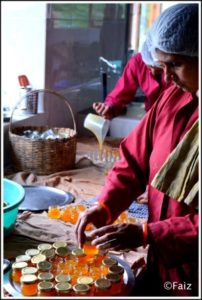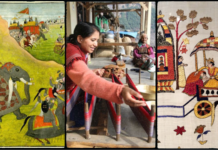Times have changed. Ramkali is now popular as “Aunty Number 1”. No longer timid and dejected as she was about 20 years ago when she was beaten, robbed and deserted by an alcoholic husband, today she is bursting with infectious energy. Bunched together with her noisy gaggle of women in the overgrown, flower and bird infested lawn beside their cottage housing the Jam factory amidst the pristine environs of orchards and forests and a narrow winding mountain road, Ramkali is home and it is tea time at Bhuira Jams.

A 45-kilometer mountain road winds down from the city of Solan towards Rajgarh town and further ahead the gradient rises steeply till you cross Churwadhar. A further 3 kilometers away, with forested mountainsides on one side and a valley golden with wheat framed with blue skies on top nestles Bhuira village. Like many other far-flung Himalayan villages, simplicity driven by the poor economy is a way of life. Modern amenities are a luxury.
When in June 1991 Linnet Mushran first came to Bhuira village to take care of her husband’s uncles’ cottage set in a 1-acre apple orchard she was struck by the beauty of the place and the bountiful nature being feasted on by birds, much of it going waste. She could not miss the poverty and abandoned the state of many women in the village. On one of those visits, she gathered some apples and set some apple jelly she learned making from her mother in England. Though she did not have any of her jam pots and pans for making them, in her own words, “the apple jelly set like a dream”. Some of the local women were excited about it and so the journey of Bhuira Jams started.
Aunty No.1 also known as the “Headmistress” –Ramkali recounts the wonderful days they had when Bhuira Jams commenced production. “We danced, sang and distributed sweets. We were very happy and excited”. The first unit of Bhuira Jams came up right next to the Linnet Mushran’s cottage. Women from Bhuira found work at the factory.
Another employee – an old timer recounts her days prior to joining Bhuira Jams. “Those days were tough. We did not have enough to eat. For my children, I used to borrow from my relatives and I did not like it. Many times I went hungry myself”. With Bhuira Jams she started at a daily wage of Rs 50/- and now she proudly earns Rs. 120/- which turns out to around Rs. 3000 a month. Without any formal education, she and many like hers have found economic independence. Financial health has also driven up their social equity. Now they are able to stand up and ask questions in the local panchayats and set the agenda. Day to day needs is no longer a tough ask.

The initial batch of her jams which Linnet placed in a corner shop of Kasauli was sold out very quickly which indicated the great quality of product she and her village women made. However, going was not easy. All sorts of issues came along the way. Recovering money post sales from retailers was one of the initial problems faced. It led to a fund getting tied up in the market and served as a lesson. Basic issues like continuous availability of electricity and water plagued them. Electricity was necessary to keep the fruits refrigerated. Raw material going bad affected the production adversely. Cooking gas was in short supply in the mountains and cost was high with transport adding up to the overheads. Linnet engaged herself in constant follow-up with local government authorities to sort out these issues.
Even social issues came in the way. Linnet recollects that caste system came in way of women coming to work. Primarily, she would get only low caste women-perhaps because they were the most economically and socially challenged. She made sure that once within Bhuira Jams, there was no distinction on basis of caste. Everyone is treated equally. In a meeting with her women, she addresses them as equals. “This is your business. You have to think above yourselves when you are here at Bhuira Jams. I value each one of you and I will ensure that I will help you sort out any problem you may have. I don’t want you to face any tension.” It is this friendliness and down to earth approach that has won Bhuira Jams the success which is difficult to replicate.
She recognized early on that lives and livelihoods depended on the enterprise. Hopes of the Bhuira women were too precious for Linnet. To address cash flow issues, she had to part with her label” Bhuira Jams” when she started supplying produce to FabIndia though she wasn’t too keen on it. But the deal brought much-needed cash on their enterprise which was so important to keep business and the women going. With a temporary electricity connection, they could store more of the fruits helping them ramp up production. In due course, Bhuira Jams also earned FPO certification. Production and sales gathered steam.
With an upswing in fortunes, the women of Bhuira Jams have come up the curve too. Ramkali recollects: “Earlier, while counting cash my hands would tremble. Now I can count any amount with ease”. The bank manager is happy to share that the women can now handle banking transactions on their own. This enthusiasm is reflected by the market too. Retailers too, commend the enterprise of the women. “It is worthwhile to see their confidence level. Now they come here routinely for stock-checking and conduct marketing activities”.

Bhuira Jams commissioned their second production facility at Halonipul nearby Bhuira. “When production hit 70 metric tonnes with a capacity of 50 metric tonnes, we knew it was time to establish a second unit which would exclusively take care of production while the original unit also handles raw material during the season,” remarks Linnet. She wants to ensure that Bhuira Jams lives beyond her and continues to grow and fervently desires that the women of Bhuira continue to be the torch bearers of the success. She has made up her mind to turn it into a private limited company with the women of Bhuira being the shareholders.
Meanwhile, the women of Bhuira who now number over 100 in the peak season are keen to take their and Bhuira Jams journey forward. A portion of their savings goes to an employee’s benevolent fund and the corpus can be utilized by any of its members in times of medical emergencies and towards the education of their children. Many of them now routinely save money in bank accounts and have even opened fixed deposits. The teacher in a local government school is happy to point out that the children are now much better fed and fare better in terms of health.
Newfound financial independence the women of Bhuira has pushed up the Bhuira women to next rung of social empowerment. They now have a power of dreams on their side. “My son wants to study and serve in the Army, protect the nation”. Words energized with hope and dreams, she picks up her uniform and gets on way to Bhuira Jam Factory. She is looking forward to a busy day at work.
Submitted by: Faiz458@hotmail.com






















89w1zi
Thanks for your wonderful review Abira..
Beautifully written , this piece has a soul.